(完整版)英语作文全球化对文化的影响
- 格式:doc
- 大小:20.01 KB
- 文档页数:2
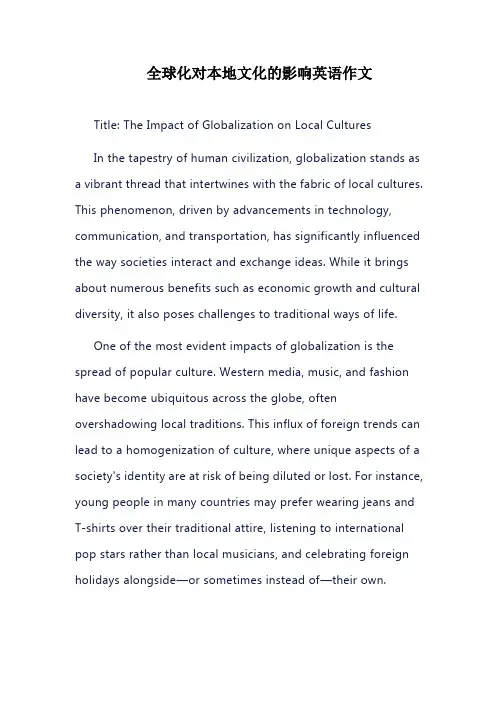
全球化对本地文化的影响英语作文Title: The Impact of Globalization on Local CulturesIn the tapestry of human civilization, globalization stands as a vibrant thread that intertwines with the fabric of local cultures. This phenomenon, driven by advancements in technology, communication, and transportation, has significantly influenced the way societies interact and exchange ideas. While it brings about numerous benefits such as economic growth and cultural diversity, it also poses challenges to traditional ways of life.One of the most evident impacts of globalization is the spread of popular culture. Western media, music, and fashion have become ubiquitous across the globe, often overshadowing local traditions. This influx of foreign trends can lead to a homogenization of culture, where unique aspects of a society's identity are at risk of being diluted or lost. For instance, young people in many countries may prefer wearing jeans and T-shirts over their traditional attire, listening to international pop stars rather than local musicians, and celebrating foreign holidays alongside—or sometimes instead of—their own.However, globalization also presents opportunities for cultural exchange and enrichment. Exposure to different cultures through travel, international films, and the internet can foster understanding and appreciation among diverse groups of people. It allows individuals to learn from one another, creating a more informed and cosmopolitan worldview. Moreover, global markets have made it possible for local artists and craftsmen to showcase their work to an international audience, thereby preserving and promoting their heritage.The influence of globalization extends beyond the superficial level of fashion and entertainment. It penetrates deeper into the social fabric, affecting values, beliefs, and norms. As societies adopt more liberal attitudes towards issues like gender equality and LGBTQ+ rights, traditional views can be challenged, leading to both progress and conflict within communities. The blending of cultural practices can result in new forms of expression and lifestyle choices but may also cause tension between those who wish to preserve tradition and those who embrace change.Education systems are not immune to the effects of globalization either. Curricula increasingly include elements of international education, preparing students for a globalizedworkforce. While this enhances employability and adaptability, it can also diminish the focus on local history and language, which are essential for maintaining a sense of cultural identity.In conclusion, while globalization offers a plethora of benefits, it is imperative to approach its influence with mindfulness. Balancing the integration of global trends with the preservation of local culture requires a delicate equilibrium. Educational policies should aim to instill pride in local heritage alongside global awareness. Cultural exchange programs can be implemented to encourage mutual respect and understanding. Most importantly, communities must engage in dialogue to determine how they wish to navigate the currents of globalization while keeping their cultural roots intact. By doing so, we can build a future where diversity thrives, and every culture has a voice in the global conversation.。
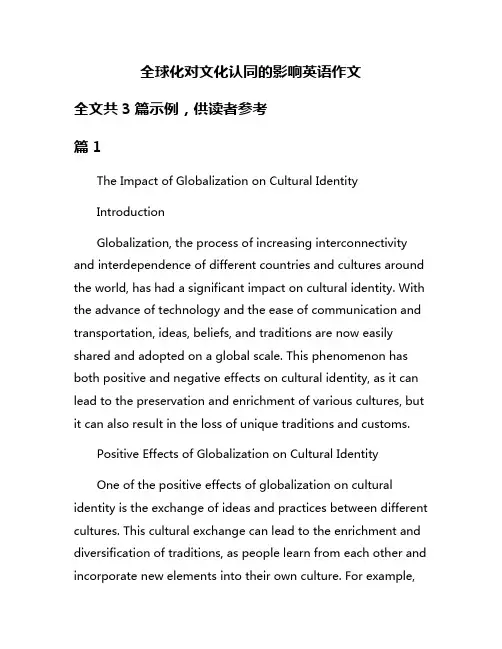
全球化对文化认同的影响英语作文全文共3篇示例,供读者参考篇1The Impact of Globalization on Cultural IdentityIntroductionGlobalization, the process of increasing interconnectivity and interdependence of different countries and cultures around the world, has had a significant impact on cultural identity. With the advance of technology and the ease of communication and transportation, ideas, beliefs, and traditions are now easily shared and adopted on a global scale. This phenomenon has both positive and negative effects on cultural identity, as it can lead to the preservation and enrichment of various cultures, but it can also result in the loss of unique traditions and customs.Positive Effects of Globalization on Cultural IdentityOne of the positive effects of globalization on cultural identity is the exchange of ideas and practices between different cultures. This cultural exchange can lead to the enrichment and diversification of traditions, as people learn from each other and incorporate new elements into their own culture. For example,the fusion of different cuisines or the blending of musical styles from different regions can create unique cultural expressions that reflect the diversity and creativity of the global community.Globalization also provides opportunities for people to learn about and appreciate different cultures. Through travel, education, and the media, individuals can gain insight into the values, beliefs, and customs of others, promoting greater tolerance and understanding among diverse groups of people. This exposure to different cultures can help individuals develop a sense of empathy and respect for others, fostering a more inclusive and harmonious global society.Negative Effects of Globalization on Cultural IdentityDespite its positive aspects, globalization can also have negative effects on cultural identity. One of the major concerns is the homogenization of culture, as the spread of Western ideals and values can lead to the marginalization of indigenous traditions and customs. This cultural imperialism can result in the loss of unique cultural practices, languages, and belief systems, as people are influenced by dominant global trends and norms.Furthermore, globalization can lead to the commodification of culture, as traditional arts and crafts are often commercialized and marketed to appeal to a global audience. Thiscommercialization can strip cultural expressions of their authenticity and intrinsic meaning, reducing them to mere products for consumption. As a result, cultural heritage can be devalued and exploited for economic gain, undermining the integrity and significance of indigenous traditions.ConclusionIn conclusion, globalization has had a profound impact on cultural identity, shaping the way people perceive and express their cultural heritage. While globalization can foster cultural exchange and understanding, it can also result in the erosion of unique traditions and customs. It is essential for individuals and communities to actively preserve and promote their cultural identity in the face of global influences, embracing diversity and celebrating the richness of human expression. By recognizing the importance of cultural heritage and values, we can ensure the preservation and vitality of our diverse cultural identities in a globalized world.篇2Impact of Globalization on Cultural IdentityGlobalization, as a process of increased interconnectedness and interdependence among countries, has had a profoundimpact on cultural identity around the world. The exchange of ideas, values, beliefs, and practices across borders has led to the fusion of different cultures, resulting in both positive and negative consequences for individuals and societies. This essay will examine the effects of globalization on cultural identity and explore how individuals can maintain a sense of identity in the face of globalizing forces.One of the key ways in which globalization affects cultural identity is through the spread of Western values and norms. As Western culture is often portrayed as progressive and modern, many societies have adopted Western practices in order to keep pace with the changing global landscape. This has led to the homogenization of cultures, with traditional customs and beliefs being replaced by Western ideals. For example, the popularity of fast food chains and Hollywood movies has led to an erosion of local cuisines and film industries in many countries.Furthermore, globalization has also led to the commodification of culture, with traditional practices and symbols being turned into marketable goods and services. This commercialization of culture can lead to the distortion and simplification of complex cultural identities, as they are reduced to stereotypes and cliches in order to appeal to a globalaudience. For instance, the appropriation of Native American symbols in fashion and music without proper understanding or respect for their cultural significance can lead to the misrepresentation of indigenous communities.However, globalization also has the potential to enrich cultural identity by fostering cross-cultural understanding and dialogue. The exchange of ideas and practices between different cultures can lead to the creation of new forms of expression that blend elements from multiple traditions. For example, the fusion of hip-hop music with traditional African rhythms has produced new genres of music that reflect the diversity and creativity of the global community.In order to maintain a sense of cultural identity in the face of globalization, individuals must actively engage with their own traditions and beliefs, while also being open to learning from others. By recognizing the value of their cultural heritage and sharing it with others, individuals can preserve their unique identity while embracing the diversity of the global community. Additionally, governments and organizations can support cultural preservation efforts by investing in education and the arts, as well as promoting intercultural dialogue and exchange.In conclusion, globalization has had a profound impact on cultural identity by both eroding traditional practices and fostering the creation of new forms of expression. While it is important to recognize the challenges posed by globalization, it is also crucial to embrace the opportunities for cultural exchange and dialogue that it brings. By actively engaging with their own heritage and sharing it with others, individuals can maintain a sense of identity in an increasingly interconnected world.篇3Impact of Globalization on Cultural IdentityIntroductionGlobalization has transformed the way societies interact and communicate, creating a global village where people from different corners of the world can connect and exchange ideas. While globalization has brought about numerous benefits, such as economic growth and technological advancements, it has also had a significant impact on cultural identity. The process of globalization has led to the convergence of cultures, blurring the lines between traditions, values, and beliefs. This essay will explore the impact of globalization on cultural identity,highlighting both the positive and negative effects of this phenomenon.Positive Impact of Globalization on Cultural IdentityOne of the positive impacts of globalization on cultural identity is the exchange of ideas and values between different cultures. As people from different parts of the world come into contact with each other through trade, travel, and communication, they have the opportunity to learn about and appreciate the diversity of human cultures. This exchange of ideas can lead to greater understanding and tolerance between peoples, fostering a sense of global citizenship.Globalization has also facilitated the spread of cultural products, such as music, literature, and art, to a global audience. This has allowed artists and creators from different cultures to reach a wider audience and share their unique perspectives with the world. In turn, consumers have access to a diverse array of cultural products, enriching their own cultural experiences.Furthermore, globalization has enabled the preservation and revitalization of traditional cultures in the face of modernization. As societies become more interconnected, there is a growing interest in preserving and promoting traditional practices and customs. For example, indigenous communities are now able toshowcase their traditional crafts and rituals to a global audience, helping to preserve their cultural heritage for future generations.Negative Impact of Globalization on Cultural IdentityDespite the positive aspects of globalization, there are also negative impacts on cultural identity. One of the major concerns is the homogenization of cultures, as globalized media and consumer products promote a standard set of values and lifestyles. This can lead to the erosion of local traditions and customs, as younger generations prioritize global trends over traditional practices.Another negative impact of globalization on cultural identity is the commodification of culture, as traditional practices and artifacts are appropriated and commercialized for mass consumption. This can lead to the exploitation of cultural heritage for profit, as corporations and tourism industries capitalize on the appeal of exotic cultures without respecting their significance or authenticity.Furthermore, globalization has created a sense of cultural imperialism, as dominant cultures exert influence over marginalized communities, imposing their values and norms on others. This can lead to cultural hegemony, where the dominant culture dominates and suppresses the cultural expression ofminority groups, leading to a loss of cultural diversity and identity.ConclusionIn conclusion, globalization has had a profound impact on cultural identity, shaping the way people perceive and interact with their own cultures and those of others. While globalization has facilitated the exchange of ideas and values between cultures, it has also led to the homogenization and commodification of cultural expressions. As societies continue to navigate the challenges of globalization, it is essential to promote and preserve cultural diversity and identity in order to ensure a more inclusive and equitable world for all.。
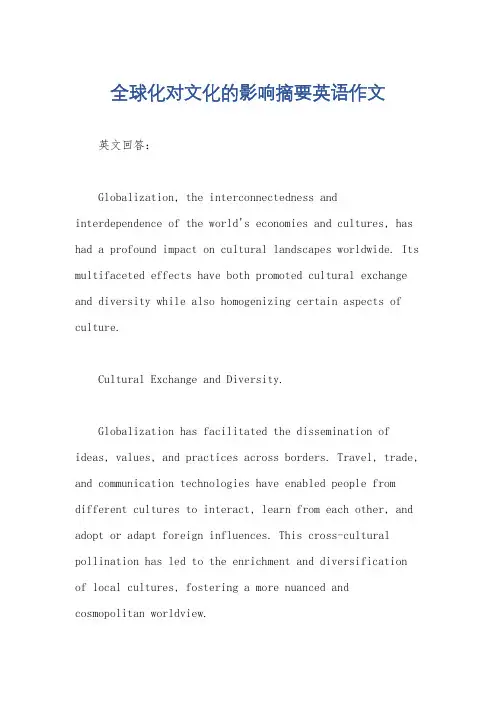
全球化对文化的影响摘要英语作文英文回答:Globalization, the interconnectedness and interdependence of the world's economies and cultures, has had a profound impact on cultural landscapes worldwide. Its multifaceted effects have both promoted cultural exchange and diversity while also homogenizing certain aspects of culture.Cultural Exchange and Diversity.Globalization has facilitated the dissemination of ideas, values, and practices across borders. Travel, trade, and communication technologies have enabled people from different cultures to interact, learn from each other, and adopt or adapt foreign influences. This cross-cultural pollination has led to the enrichment and diversification of local cultures, fostering a more nuanced and cosmopolitan worldview.Cultural Diversity and Identity.Global interconnectedness has also stimulated the preservation and revitalization of traditional cultures. Faced with the potential threat of homogenization, many communities have sought to maintain and showcase their unique heritage. This has led to the resurgence of local languages, customs, and artistic traditions, contributing to a greater appreciation of cultural diversity.Cultural Homogenization.While globalization has fostered cultural exchange and diversity, it has also led to some degree of cultural homogenization. The rise of global media, consumer culture, and mass tourism has disseminated certain Western values and practices, creating a more uniform cultural landscape. This process has been criticized for eroding local distinctiveness and fostering a sense of cultural loss.Cultural Renaissance.In response to the perceived threat of cultural homogenization, many societies have embraced a cultural renaissance, seeking to revitalize and adapt indigenous traditions while selectively incorporating foreign influences. This hybrid approach has allowed cultures to evolve and flourish in an increasingly interconnected world.Challenges and Opportunities.Globalization's impact on culture presents numerous challenges and opportunities. While it has facilitated cultural exchange and diversity, it has also raisedconcerns about cultural preservation and identity. Governments and cultural organizations must grapple withthe complex task of balancing the benefits of global interconnectedness with the need to protect and promote unique cultural traditions.中文回答:全球化对文化的影响。
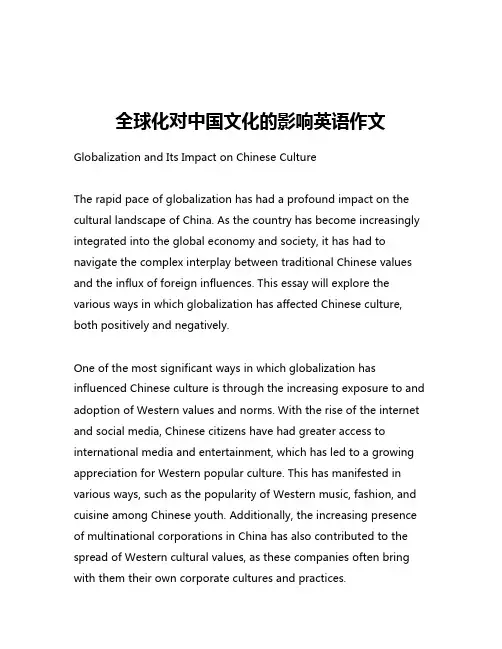
全球化对中国文化的影响英语作文Globalization and Its Impact on Chinese CultureThe rapid pace of globalization has had a profound impact on the cultural landscape of China. As the country has become increasingly integrated into the global economy and society, it has had to navigate the complex interplay between traditional Chinese values and the influx of foreign influences. This essay will explore the various ways in which globalization has affected Chinese culture, both positively and negatively.One of the most significant ways in which globalization has influenced Chinese culture is through the increasing exposure to and adoption of Western values and norms. With the rise of the internet and social media, Chinese citizens have had greater access to international media and entertainment, which has led to a growing appreciation for Western popular culture. This has manifested in various ways, such as the popularity of Western music, fashion, and cuisine among Chinese youth. Additionally, the increasing presence of multinational corporations in China has also contributed to the spread of Western cultural values, as these companies often bring with them their own corporate cultures and practices.However, this exposure to Western culture has also led to concerns about the potential erosion of traditional Chinese values and identity. Many Chinese people, particularly those of older generations, have expressed concerns about the dilution of traditional Chinese culture and the potential loss of cultural heritage. This has led to a growing sense of cultural nationalism, with efforts to preserve and promote traditional Chinese arts, literature, and philosophy.One area where the impact of globalization on Chinese culture has been particularly pronounced is in the realm of language. The increasing use of English in business, education, and popular culture has led to a growing concern about the potential decline of the Chinese language. There have been efforts by the Chinese government to promote the use of Mandarin Chinese and to limit the influence of foreign languages, particularly in the media and education sectors.Another significant impact of globalization on Chinese culture has been the increasing diversity and pluralism within Chinese society. As China has become more integrated into the global economy, it has also become more exposed to a wider range of cultural influences from around the world. This has led to a growing appreciation for cultural diversity and a greater openness to different ways of life and belief systems.However, this increased diversity has also led to some tensions and conflicts within Chinese society. There have been concerns about the potential marginalization of certain cultural and ethnic minority groups, as well as the potential for the erosion of traditional social structures and hierarchies.Despite these challenges, globalization has also brought about some positive changes to Chinese culture. For example, the increased exposure to international ideas and practices has led to a greater appreciation for human rights, environmental protection, and other progressive values. Additionally, the growing interconnectedness of the world has also led to increased cultural exchange and collaboration, with Chinese artists, scholars, and entrepreneurs engaging with their counterparts from around the world.In conclusion, the impact of globalization on Chinese culture has been complex and multifaceted. While it has brought about significant changes and challenges, it has also presented opportunities for cultural enrichment and exchange. As China continues to navigate the complexities of globalization, it will be important for policymakers and cultural leaders to find a balance between preserving traditional Chinese values and embracing the benefits of cultural diversity and international cooperation.。
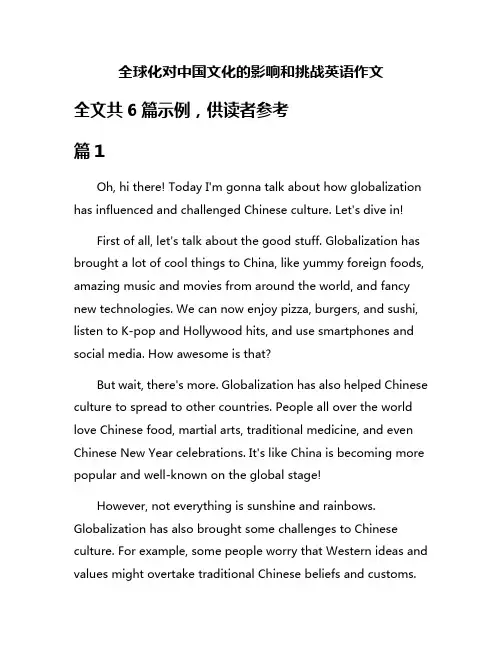
全球化对中国文化的影响和挑战英语作文全文共6篇示例,供读者参考篇1Oh, hi there! Today I'm gonna talk about how globalization has influenced and challenged Chinese culture. Let's dive in!First of all, let's talk about the good stuff. Globalization has brought a lot of cool things to China, like yummy foreign foods, amazing music and movies from around the world, and fancy new technologies. We can now enjoy pizza, burgers, and sushi, listen to K-pop and Hollywood hits, and use smartphones and social media. How awesome is that?But wait, there's more. Globalization has also helped Chinese culture to spread to other countries. People all over the world love Chinese food, martial arts, traditional medicine, and even Chinese New Year celebrations. It's like China is becoming more popular and well-known on the global stage!However, not everything is sunshine and rainbows. Globalization has also brought some challenges to Chinese culture. For example, some people worry that Western ideas and values might overtake traditional Chinese beliefs and customs.They're afraid that young people might forget about their roots and identities in this globalized world.And let's not forget about cultural appropriation. Sometimes, people from other countries copy or misuse Chinese cultural symbols and practices without understanding their true meanings. This can lead to misunderstandings and disrespect towards Chinese culture.Overall, globalization has both positive and negative impacts on Chinese culture. It's up to us to embrace the good things and protect the values that make Chinese culture unique and special. Let's celebrate diversity and learn from each other in this big, beautiful world! Peace out!篇2Globalization is something that has been happening in the world for a long time. It means that countries all around the world are becoming more connected and working together. This has had a big impact on China and its culture.One of the biggest ways that globalization has affected China is through technology. We can now talk to people in other countries instantly through the internet and social media. Thismeans that we can learn more about other cultures and share our own culture with them.Another way that globalization has impacted China is through trade. We can now buy products from all over the world and sell our own products to other countries. This has helped the Chinese economy grow and has created jobs for many people.But globalization has also brought some challenges for China. One challenge is that our traditional way of life is changing. We are starting to eat more Western food and wear Western clothes. Some people worry that this could mean that China’s unique c ulture is disappearing.Another challenge is that not everyone benefits equally from globalization. Some people in China are getting richer, but others are still struggling to make a living. This has created a lot of inequality in our country.Overall, globalization has both positive and negative effects on China. It has helped our economy grow and has connected us with people from all over the world. But it has also brought challenges that we need to address. As long as we work together, we can make sure that globalization has a positive impact on China and our culture.篇3Globalization is a big word that means the whole world is becoming connected. It's like when we play a game online with kids from different countries, or when we eat food from places far away. Globalization has changed China a lot, and there are both good things and bad things about it.One good thing about globalization is that we can learn about different cultures. We can try new foods, watch movies from other countries, and make friends with people from all over the world. This can make us more open-minded and understanding of others. We can also share our own culture with people from different countries, like teaching them Chinese traditional dances or telling them about our festivals.But globalization also brings some challenges to China. For example, some people worry that our traditional culture is being replaced by things from other countries. We see a lot of American movies and listen to Western music, and sometimes it feels like we're forgetting our own traditions. It's important to remember where we come from and to keep our culture alive.Another challenge is that globalization can make things more expensive. When we buy clothes or toys that are made inother countries, they might cost more because of the shipping and taxes. This can be tough for families who don't have a lot of money. We should try to support local businesses and buy products that are made in China.Overall, globalization has both good and bad sides for China. It's up to us to make sure that we keep our culture strong and that we take advantage of the opportunities that come with being connected to the rest of the world. Let's learn from other countries but also be proud of our own traditions.篇4Hey guys,Do you know what globalization is? It’s like when people all around the world can connect with each other through things like technology, trade, and culture. Sounds pretty cool, right? But did you know that globalization can also have an impact on China’s culture?First of all, globalization can bring some cool stuff to China’s culture. For example, we can try different kinds of foods from other countries, like pizza or sushi. We can also watch movies and TV shows from other countries, which can help us learn about different cultures and make new friends. Plus, we canlearn new things from other countries, like how to speak different languages or play different sports.But globalization can also bring some challenges to C hina’s culture. For example, some people worry that too much globalization can make us forget about our own traditions and values. We might start to copy other countries’ ways of doing things instead of being proud of our own culture. Also, some people worry that too much globalization can make it harder for us to protect our environment and our way of life.So, what do you guys think? Is globalization a good thing or a bad thing for China’s culture? Let’s keep learning about it and talking about it so we can make sure that our culture stays strong and vibrant in the global world.Thanks for reading, guys! Let’s keep exploring the world together!Bye for now!篇5Globalization is a big word that means the world is getting smaller and smaller. It's like when you play a game with friends from all over the world on the internet. The game connectspeople from different places and cultures. That's what globalization is all about.Globalization has brought many changes to China. Some of them are good, but some are not so good. Let me tell you about them.First of all, globalization has brought new ideas and technologies to China. Before, we might not have known about things like smartphones, video games, or fast food from other countries. But now, we can enjoy all these things in China! It's like having a big adventure without leaving home.But globalization also brings challenges to Chinese culture. Some people worry that our traditional customs and values might disappear with all the new things coming in. For example, many young people in China now prefer to speak English or watch American movies instead of learning our own traditional language and stories. This can make it harder to pass on our culture to the next generation.Another challenge of globalization is that it can be hard to compete with other countries. When products from other countries come to China, they might be cheaper or better quality than what we can make here. This can hurt our businesses andworkers. We have to work harder to stay competitive in the global market.But don't worry! We can also learn from other countries and make our culture even better. For example, we can mix traditional Chinese food with new flavors from around the world. This can create new and exciting dishes that everyone will love. Plus, we can use our unique culture and history to attract tourists from all over the world. This can bring more money and opportunities to China.So, in the end, globalization is like a big puzzle. We have to find the right pieces to make it work for us. We can take the good things from other countries and use them to strengthen our own culture. As long as we stay true to who we are, we can face the challenges of globalization and come out even stronger in the end. Let's embrace the world and make it our own!篇6Globalization is a very big word that means the whole world is getting closer and closer together. It's like when you play a game with your friends from different schools or when your mom buys strawberries from a farm far away. It's like that, but with countries and people all around the world!Globalization has had a big impact on China and its culture. One way it has affected China is by bringing in new ideas and ways of doing things. For example, now you can watch TV shows and movies from other countries in China. This can be fun because you get to learn about different cultures and traditions.But globalization also brings challenges for China. Some people worry that too much foreign influence might change traditional Chinese culture. They might be afraid that young people will forget about their own language, customs, and history.Another challenge is that globalization can also make it harder for Chinese businesses to compete. With more and more companies from other countries selling products in China, local businesses might struggle to keep up.One way China is tackling these challenges is by promoting its own culture and traditions. By sharing Chinese stories, music, and food with the world, China can show off its unique identity while still embracing the benefits of globalization.In conclusion, globalization has both positive and negative impacts on China and its culture. It's like having a new friend from a different country - it can be exciting and fun, but also bring some challenges. By staying true to its roots whileembracing new ideas, China can navigate the ups and downs of globalization and continue to grow and thrive on the world stage.。
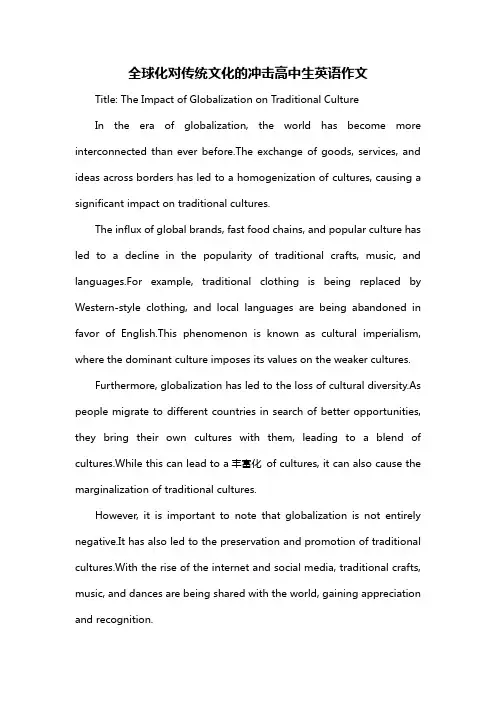
全球化对传统文化的冲击高中生英语作文Title: The Impact of Globalization on Traditional CultureIn the era of globalization, the world has become more interconnected than ever before.The exchange of goods, services, and ideas across borders has led to a homogenization of cultures, causing a significant impact on traditional cultures.The influx of global brands, fast food chains, and popular culture has led to a decline in the popularity of traditional crafts, music, and languages.For example, traditional clothing is being replaced by Western-style clothing, and local languages are being abandoned in favor of English.This phenomenon is known as cultural imperialism, where the dominant culture imposes its values on the weaker cultures.Furthermore, globalization has led to the loss of cultural diversity.As people migrate to different countries in search of better opportunities, they bring their own cultures with them, leading to a blend of cultures.While this can lead to a丰富化of cultures, it can also cause the marginalization of traditional cultures.However, it is important to note that globalization is not entirely negative.It has also led to the preservation and promotion of traditional cultures.With the rise of the internet and social media, traditional crafts, music, and dances are being shared with the world, gaining appreciation and recognition.In conclusion, globalization has had a significant impact on traditional cultures.While it has led to a decline in the popularity of traditional crafts and languages, it has also provided a platform for their preservation and promotion.It is essential to strike a balance between embracing globalization and preserving our cultural heritage.中文翻译:标题:全球化对传统文化的冲击在全球化的时代,世界比以往任何时候都更加相互联系。
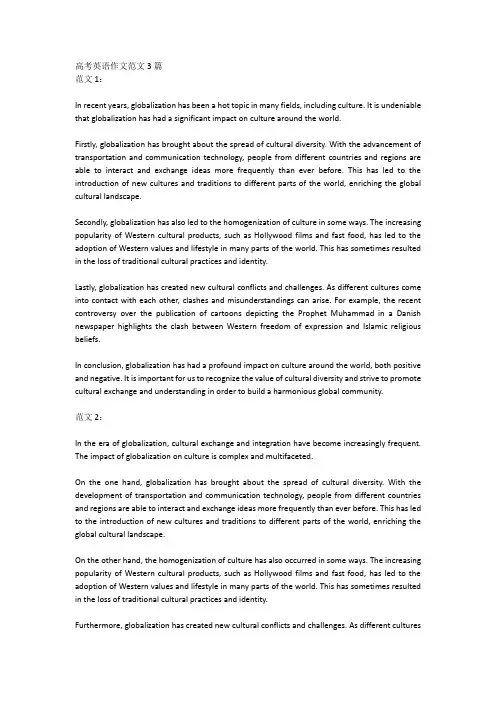
高考英语作文范文3篇范文1:In recent years, globalization has been a hot topic in many fields, including culture. It is undeniable that globalization has had a significant impact on culture around the world.Firstly, globalization has brought about the spread of cultural diversity. With the advancement of transportation and communication technology, people from different countries and regions are able to interact and exchange ideas more frequently than ever before. This has led to the introduction of new cultures and traditions to different parts of the world, enriching the global cultural landscape.Secondly, globalization has also led to the homogenization of culture in some ways. The increasing popularity of Western cultural products, such as Hollywood films and fast food, has led to the adoption of Western values and lifestyle in many parts of the world. This has sometimes resulted in the loss of traditional cultural practices and identity.Lastly, globalization has created new cultural conflicts and challenges. As different cultures come into contact with each other, clashes and misunderstandings can arise. For example, the recent controversy over the publication of cartoons depicting the Prophet Muhammad in a Danish newspaper highlights the clash between Western freedom of expression and Islamic religious beliefs.In conclusion, globalization has had a profound impact on culture around the world, both positive and negative. It is important for us to recognize the value of cultural diversity and strive to promote cultural exchange and understanding in order to build a harmonious global community.范文2:In the era of globalization, cultural exchange and integration have become increasingly frequent. The impact of globalization on culture is complex and multifaceted.On the one hand, globalization has brought about the spread of cultural diversity. With the development of transportation and communication technology, people from different countries and regions are able to interact and exchange ideas more frequently than ever before. This has led to the introduction of new cultures and traditions to different parts of the world, enriching the global cultural landscape.On the other hand, the homogenization of culture has also occurred in some ways. The increasing popularity of Western cultural products, such as Hollywood films and fast food, has led to the adoption of Western values and lifestyle in many parts of the world. This has sometimes resulted in the loss of traditional cultural practices and identity.Furthermore, globalization has created new cultural conflicts and challenges. As different culturescome into contact with each other, clashes and misunderstandings can arise. For example, the recent controversy over the publication of cartoons depicting the Prophet Muhammad in a Danish newspaper highlights the clash between Western freedom of expression and Islamic religious beliefs.In conclusion, globalization has both positive and negative impacts on culture around the world. It is important for us to recognize the value of cultural diversity and strive to promote cultural exchange and understanding in order to build a harmonious global community.范文3:With the acceleration of globalization, the impact of globalization on culture has become increasingly apparent. While globalization has brought about many positive changes, such as the spread of cultural diversity, it has also had negative impacts on culture.On the one hand, globalization has led to the spread of cultural diversity. With the development of transportation and communication technology, people from different countries and regions are able to interact and exchange ideas more frequently than ever before. This has led to the introduction of new cultures and traditions to different parts of the world, enriching the global cultural landscape.On the other hand, globalization has also led to the homogenization of culture in some ways. The increasing popularity of Western cultural products, such as Hollywood films and fast food, has led to the adoption of Western values and lifestyle in many parts of the world. This has sometimes resulted in the loss of traditional cultural practices and identity.Furthermore, globalization has created new cultural conflicts and challenges. As different cultures come into contact with each other, clashes and misunderstandings can arise. For example, the recent controversy over the publication of cartoons depicting the Prophet Muhammad in a Danish newspaper highlights the clash between Western freedom of expression and Islamic religious beliefs.In conclusion, the impact of globalization on culture is complex and multifaceted. It is important for us to recognize the value of cultural diversity and strive to promote cultural exchange and understanding in order to build a harmonious global community.。
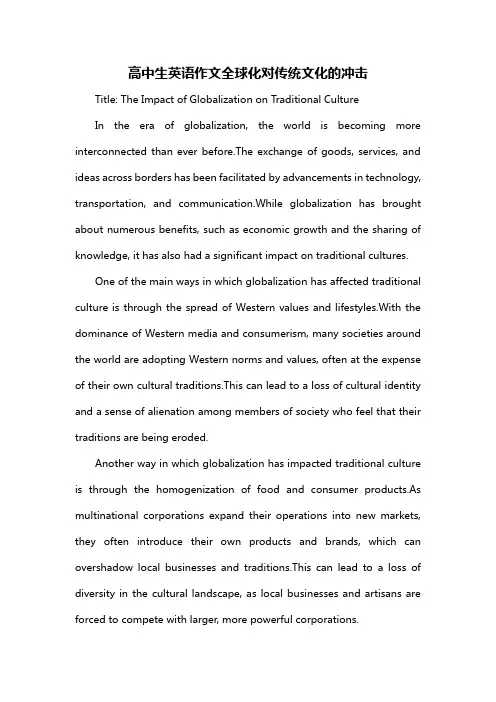
高中生英语作文全球化对传统文化的冲击Title: The Impact of Globalization on Traditional CultureIn the era of globalization, the world is becoming more interconnected than ever before.The exchange of goods, services, and ideas across borders has been facilitated by advancements in technology, transportation, and communication.While globalization has brought about numerous benefits, such as economic growth and the sharing of knowledge, it has also had a significant impact on traditional cultures.One of the main ways in which globalization has affected traditional culture is through the spread of Western values and lifestyles.With the dominance of Western media and consumerism, many societies around the world are adopting Western norms and values, often at the expense of their own cultural traditions.This can lead to a loss of cultural identity and a sense of alienation among members of society who feel that their traditions are being eroded.Another way in which globalization has impacted traditional culture is through the homogenization of food and consumer products.As multinational corporations expand their operations into new markets, they often introduce their own products and brands, which can overshadow local businesses and traditions.This can lead to a loss of diversity in the cultural landscape, as local businesses and artisans are forced to compete with larger, more powerful corporations.Furthermore, globalization has also led to the loss of languages and cultural practices.As people around the world adopt English as a second language, many local languages are being abandoned.This can lead to a loss of cultural heritage and a decrease in the number of people who are able to pass on traditional knowledge and practices to future generations.In conclusion, globalization has had a profound impact on traditional cultures around the world.While it has brought about many benefits, such as economic growth and the sharing of knowledge, it has also led to the loss of cultural identity, diversity, and heritage.It is important for societies to find a balance between embracing globalization and preserving their own cultural traditions for future generations.中文翻译:标题:全球化对传统文化的冲击在全球化时代,世界比以往任何时候都更加相互连接。
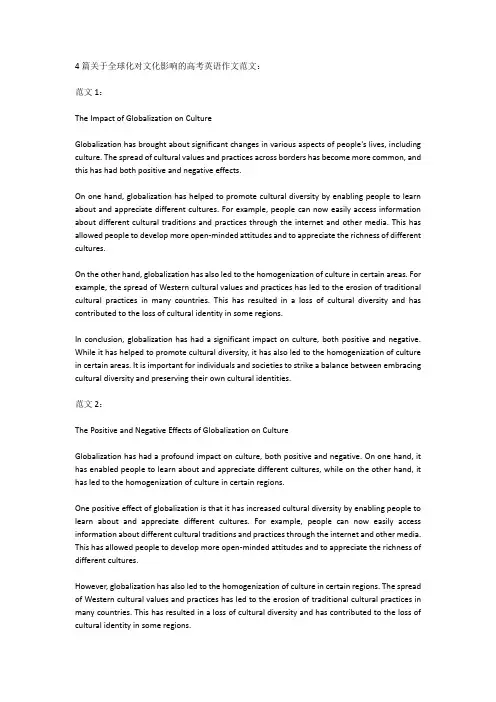
4篇关于全球化对文化影响的高考英语作文范文:范文1:The Impact of Globalization on CultureGlobalization has brought about significant changes in various aspects of people's lives, including culture. The spread of cultural values and practices across borders has become more common, and this has had both positive and negative effects.On one hand, globalization has helped to promote cultural diversity by enabling people to learn about and appreciate different cultures. For example, people can now easily access information about different cultural traditions and practices through the internet and other media. This has allowed people to develop more open-minded attitudes and to appreciate the richness of different cultures.On the other hand, globalization has also led to the homogenization of culture in certain areas. For example, the spread of Western cultural values and practices has led to the erosion of traditional cultural practices in many countries. This has resulted in a loss of cultural diversity and has contributed to the loss of cultural identity in some regions.In conclusion, globalization has had a significant impact on culture, both positive and negative. While it has helped to promote cultural diversity, it has also led to the homogenization of culture in certain areas. It is important for individuals and societies to strike a balance between embracing cultural diversity and preserving their own cultural identities.范文2:The Positive and Negative Effects of Globalization on CultureGlobalization has had a profound impact on culture, both positive and negative. On one hand, it has enabled people to learn about and appreciate different cultures, while on the other hand, it has led to the homogenization of culture in certain regions.One positive effect of globalization is that it has increased cultural diversity by enabling people to learn about and appreciate different cultures. For example, people can now easily access information about different cultural traditions and practices through the internet and other media. This has allowed people to develop more open-minded attitudes and to appreciate the richness of different cultures.However, globalization has also led to the homogenization of culture in certain regions. The spread of Western cultural values and practices has led to the erosion of traditional cultural practices in many countries. This has resulted in a loss of cultural diversity and has contributed to the loss of cultural identity in some regions.In conclusion, globalization has had both positive and negative effects on culture. While it has helped to promote cultural diversity, it has also led to the homogenization of culture in certain areas. It is important for individuals and societies to strike a balance between embracing cultural diversity and preserving their own cultural identities.范文3:The Impact of Globalization on Cultural ExchangeGlobalization has brought about significant changes in cultural exchange, by enabling people to learn about and appreciate different cultures. The spread of cultural values and practices across borders has become more common, and this has had both positive and negative effects.One positive effect of globalization on cultural exchange is that it has increased cultural diversity. People can now easily access information about different cultural traditions and practices through the internet and other media. This has allowed people to develop more open-minded attitudes and to appreciate the richness of different cultures.However, globalization has also led to the homogenization of culture in certain regions. The spread of Western cultural values and practices has led to the erosion of traditional cultural practices in many countries. This has resulted in a loss of cultural diversity and has contributed to the loss of cultural identity in some regions.In conclusion, the impact of globalization on cultural exchange has been both positive and negative. While it has helped to promote cultural diversity, it has also led to the homogenization of culture in certain areas. It is important for individuals and societies to strike a balance between embracing cultural diversity and preserving their own cultural identities.范文4:Globalization and the Preservation of Cultural HeritageGlobalization has had a significant impact on cultural heritage, as it has led to the erosion of traditional cultural practices in many countries. However, there are also efforts being made to preserve cultural heritage in the face of globalization.One positive effect of globalization on the preservation of cultural heritage is that it has enabled people to learn about and appreciate different cultures. People can now easily access information about different cultural traditions and practices through the internet and other media. This has allowed people to develop more open-minded attitudes and to appreciate the richness of different cultures.However, globalization has also led to the homogenization of culture in certain regions. The spreadof Western cultural values and practices has led to the erosion of traditional cultural practices in many countries. This has resulted in a loss of cultural diversity and has contributed to the loss of cultural identity in some regions.In conclusion, globalization has had both positive and negative effects on the preservation of cultural heritage. While it has helped to promote cultural diversity, it has also led to the homogenization of culture in certain areas. It is important for individuals and societies to strike a balance between embracing cultural diversity and preserving their own cultural identities.。
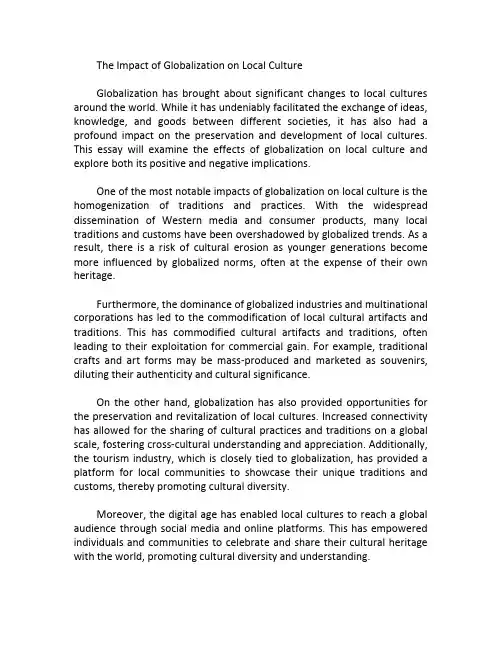
The Impact of Globalization on Local CultureGlobalization has brought about significant changes to local cultures around the world. While it has undeniably facilitated the exchange of ideas, knowledge, and goods between different societies, it has also had a profound impact on the preservation and development of local cultures. This essay will examine the effects of globalization on local culture and explore both its positive and negative implications.One of the most notable impacts of globalization on local culture is the homogenization of traditions and practices. With the widespread dissemination of Western media and consumer products, many local traditions and customs have been overshadowed by globalized trends. As a result, there is a risk of cultural erosion as younger generations become more influenced by globalized norms, often at the expense of their own heritage.Furthermore, the dominance of globalized industries and multinational corporations has led to the commodification of local cultural artifacts and traditions. This has commodified cultural artifacts and traditions, often leading to their exploitation for commercial gain. For example, traditional crafts and art forms may be mass-produced and marketed as souvenirs, diluting their authenticity and cultural significance.On the other hand, globalization has also provided opportunities for the preservation and revitalization of local cultures. Increased connectivity has allowed for the sharing of cultural practices and traditions on a global scale, fostering cross-cultural understanding and appreciation. Additionally, the tourism industry, which is closely tied to globalization, has provided a platform for local communities to showcase their unique traditions and customs, thereby promoting cultural diversity.Moreover, the digital age has enabled local cultures to reach a global audience through social media and online platforms. This has empowered individuals and communities to celebrate and share their cultural heritage with the world, promoting cultural diversity and understanding.In conclusion, globalization has had a multifaceted impact on local cultures. While it has posed challenges to the preservation of traditional practices and customs, it has also offered opportunities for their promotion and preservation. As we navigate the complexities of a globalized world, it is essential to recognize and respect the diversity of local cultures and work towards fostering a more inclusive and harmonious global society.。
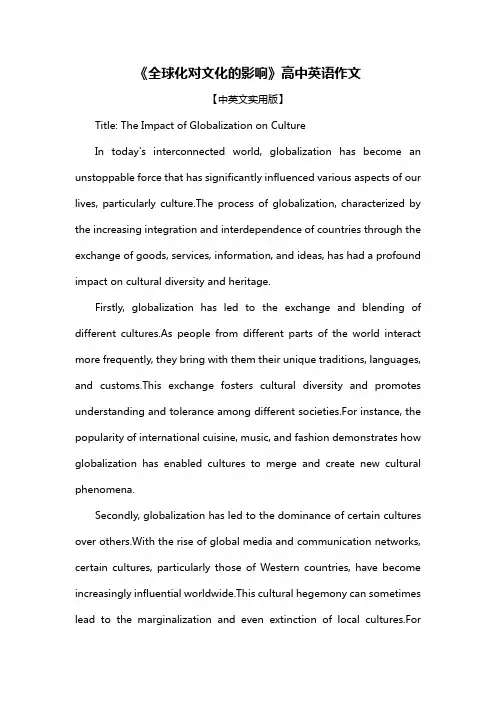
《全球化对文化的影响》高中英语作文【中英文实用版】Title: The Impact of Globalization on CultureIn today's interconnected world, globalization has become an unstoppable force that has significantly influenced various aspects of our lives, particularly culture.The process of globalization, characterized by the increasing integration and interdependence of countries through the exchange of goods, services, information, and ideas, has had a profound impact on cultural diversity and heritage.Firstly, globalization has led to the exchange and blending of different cultures.As people from different parts of the world interact more frequently, they bring with them their unique traditions, languages, and customs.This exchange fosters cultural diversity and promotes understanding and tolerance among different societies.For instance, the popularity of international cuisine, music, and fashion demonstrates how globalization has enabled cultures to merge and create new cultural phenomena.Secondly, globalization has led to the dominance of certain cultures over others.With the rise of global media and communication networks, certain cultures, particularly those of Western countries, have become increasingly influential worldwide.This cultural hegemony can sometimes lead to the marginalization and even extinction of local cultures.Forexample, the spread of English as a global lingua franca threatens the survival of many indigenous languages.Furthermore, globalization has also facilitated the protection and preservation of cultural anizations such as the United Nations Educational, Scientific and Cultural Organization (UNESCO) work towards safeguarding intangible cultural heritage through initiatives like the List of Intangible Cultural Heritage in Need of Urgent Safeguarding.Additionally, globalization has allowed for the documentation and sharing of cultural practices, thereby raising awareness and appreciation for diverse cultural traditions.In conclusion, globalization has had a dual impact on culture.On one hand, it has promoted the exchange and blending of different cultures, enriching our global tapestry.On the other hand, it has also led to the dominance of certain cultures and the potential loss of local traditions.As we continue to live in an increasingly globalized world, it is crucial to strike a balance between embracing cultural diversity and preserving the uniqueness of individual cultures.By doing so, we can foster a more inclusive and harmonious global community.。
全球化对文化认同的影响英语作文The Impact of Globalization on Cultural IdentityIntroductionGlobalization, the ongoing process of increased interconnectedness and interdependence among countries, has had a profound impact on culture and cultural identity. As people from different parts of the world come into contact with each other through trade, technology, and communication, ideas, languages, values, and traditions are exchanged and shared. While globalization has brought about many positive changes such as economic growth, cultural exchange, and technological advancement, it has also raised concerns about the loss of cultural identity and the homogenization of cultures. In this essay, we will explore the impact of globalization on cultural identity and the ways in which individuals and societies can preserve their cultural heritage in the face of globalization.Cultural Diversity and HomogenizationOne of the main concerns about globalization is the threat it poses to cultural diversity. As Western culture, particularly American culture, is spread around the world through movies, music, fashion, and fast food chains, local cultures are oftenmarginalized or even erased. This process of cultural homogenization, sometimes referred to as "McDonalisation" or "Coca-Colonization," can lead to the loss of unique traditions, languages, and values that have been passed down through generations. For example, young people in many countries now prefer to speak English rather than their native language, wear Western clothing instead of traditional garments, and consume American fast food rather than local cuisine.Cultural Assimilation and ResistanceAnother consequence of globalization is the pressure to assimilate to dominant cultures in order to succeed in the global economy. In order to compete in the global marketplace, individuals and societies often feel the need to adopt Western norms and values, which can lead to the erosion of their cultural identity. For example, in countries like China and India, young people are encouraged to pursue careers in science, technology, engineering, and mathematics (STEM) fields, while traditional arts and crafts are often undervalued and marginalized. This can create a sense of alienation and disconnection from one's cultural roots, leading to feelings of insecurity and identity crisis.Cultural Preservation and RevitalizationDespite these challenges, many individuals and societies are finding ways to preserve and revitalize their cultural heritage in the face of globalization. One way to do this is by promoting cultural exchange and dialogue between different communities in order to celebrate diversity and foster mutual understanding. For example, the United Nations Educational, Scientific and Cultural Organization (UNESCO) has designated numerous cultural heritage sites around the world to raise awareness of the importance of preserving cultural diversity. By showcasing traditional music, dance, art, and cuisine, these sites help to keep alive the unique traditions and customs of different cultures.Another way to preserve cultural identity is by supporting local artisans, craftsmen, and small businesses that produce traditional goods and services. By buying handmade crafts, organic foods, and locally-made products, consumers can help to support the livelihoods of indigenous communities and promote sustainable development. In addition, governments can play a key role in protecting and promoting cultural heritage by enacting laws and policies that preserve historic sites, traditional knowledge, and indigenous languages.ConclusionIn conclusion, globalization has had a profound impact on cultural identity, creating both opportunities and challenges for individuals and societies around the world. While the spread of Western culture has led to the homogenization of cultures and the erosion of traditional values, there are ways to preserve and revitalize cultural heritage in the face of globalization. By promoting cultural exchange, supporting local artisans, and enacting policies that protect cultural diversity, we can ensure that our rich cultural heritage is preserved for future generations to enjoy. It is important for individuals to embrace their cultural identity while also embracing the benefits of globalization. Through dialogue, understanding, and cooperation, we can build a more inclusive and diverse world that celebrates the unique traditions and customs of all cultures.。
全球化对文化认同的影响英语作文The Impact of Globalization on Cultural IdentityIntroductionGlobalization is a multifaceted phenomenon that has significantly influenced various aspects of our lives, including culture. As people from different parts of the world interact more frequently due to advances in technology and communication, our cultural identities are inevitably shaped and transformed. This essay will explore the impact of globalization on cultural identity, examining both the positive and negative aspects of this phenomenon.Positive Effects of Globalization on Cultural IdentityOne of the positive effects of globalization on cultural identity is the increased exposure to different cultures and traditions. As people travel more frequently and interact with individuals from diverse backgrounds, they are able to learn about different customs, beliefs, and practices. This exposure to different cultures can broaden one's perspective and foster greater understanding and tolerance towards others.Globalization has also led to the emergence of a global culture, where certain cultural elements, such as music, fashion,and food, are shared and appreciated across borders. This cultural exchange can lead to the enrichment and diversification of cultures, as people incorporate elements from different traditions into their own cultural practices. For example, the fusion of different cuisines has led to the creation of new culinary delights that reflect a blend of different influences.Furthermore, globalization has made it easier for individuals to express and share their cultural identities with the world. The rise of social media and digital platforms has provided people with a means to showcase their cultural heritage through music, art, and storytelling. This increased visibility of different cultures can help to preserve and promote unique cultural traditions that may have been overlooked or marginalized in the past.Negative Effects of Globalization on Cultural IdentityDespite the positive aspects of globalization on cultural identity, there are also negative implications that need to be considered. One of the concerns is the homogenization of culture, where certain cultural norms and practices are being standardized and adopted globally. This can lead to the erosion of unique cultural identities and traditions, as local customs are overshadowed by global trends.Moreover, the dominance of Western culture in the global arena has raised concerns about cultural imperialism and the marginalization of non-Western cultures. As Western media and consumer products are distributed worldwide, there is a risk that indigenous cultures may be subsumed or distorted in favor of Western values and ideologies. This can result in a loss of cultural diversity and contribute to the spread of cultural stereotypes and prejudices.Globalization has also raised questions about the commodification of culture, where cultural products and traditions are reduced to marketable commodities for profit. This commercialization of culture can lead to the exploitation and appropriation of cultural heritage for economic gain, without due respect or recognition for the origins and significance of these traditions.ConclusionIn conclusion, globalization has had a profound impact on cultural identity, reshaping the way we perceive and experience our cultural heritage. While globalization has facilitated the exchange and appreciation of diverse cultures, it has also raised concerns about cultural homogenization, imperialism, and commodification. It is essential for us to recognize the complexinterplay between globalization and cultural identity, and to strive towards a more inclusive and equitable global society that values and respects the diversity of cultural expressions. By embracing the richness and complexity of different cultures, we can work towards a more harmonious and interconnected world where cultural identities are celebrated and preserved for future generations to enjoy.。
Globalization's Impact on Chinese Culture In the era of globalization, the intermingling of cultures has become increasingly prominent, and China, as a major player in the global stage, has been deeply influenced by this trend. The impact of globalization on Chinese culture is multifaceted and complex, encompassing both positive and negative aspects.On the positive side, globalization has brought about a surge in cross-cultural exchanges, enabling Chinese culture to reach a wider audience and gain greater recognition internationally. The popularity of Chinese movies, music, and literature has increased significantly in recent years, attracting a large number of foreign admirers. This has not only boosted China's cultural soft power but also promoted the understanding and appreciation of Chinese culture among people from different backgrounds.Moreover, globalization has facilitated the integration of Chinese culture with other cultures, leading to the emergence of new cultural forms and expressions. For instance, the fusion of Chinese elements with Western fashion and design has created a unique aesthetic that isboth fashionable and culturally significant. Similarly, the integration of Chinese music with international genres has produced innovative and appealing musical works that transcend cultural boundaries.However, the negative impact of globalization on Chinese culture cannot be ignored. The influx of foreign cultures and values has led to a certain degree of cultural homogenization, eroding the uniqueness and authenticity of Chinese culture. Younger generations, particularly those born and raised in the digital age, are increasingly influenced by Western popular culture, sometimes at the cost of neglecting their own cultural heritage.Furthermore, the commercialization and standardization of culture under the influence of globalization have posed challenges to the preservation and development oftraditional Chinese culture. Many traditional art forms and crafts are facing extinction due to lack of funding and support, while the standardization of cultural products often leads to a loss of cultural diversity and creativity. To address these challenges, it is crucial for China to strike a balance between embracing globalization andsafeguarding its cultural identity. This requires promoting cross-cultural exchanges while emphasizing the importance of preserving and promoting traditional Chinese culture. It also necessitates fostering a sense of cultural pride and self-confidence among the younger generation, encouraging them to appreciate and inherit their cultural heritage.In conclusion, globalization has brought about both opportunities and challenges for Chinese culture. While it has expanded the reach and influence of Chinese culture internationally, it has also threatened the preservation and authenticity of traditional Chinese culture. It is therefore essential for China to find a way to embrace globalization while maintaining its cultural identity and promoting the diversity and creativity of its cultural expressions.**全球化对中国文化的影响**在全球化时代,文化的交融变得越来越突出,中国作为世界舞台上的重要角色,也深受这一趋势的影响。
全球化对文化多样性的影响英语作文Title: The Impact of Globalization on Cultural DiversityIn the interconnected era of the 21st century, globalization has emerged as a ubiquitous force, reshaping economies, societies, and, most significantly, cultures across the globe. This vast process, driven by advancements in technology, trade liberalization, and the proliferation of information, has undeniably sparked debates on its implications for cultural diversity—a cornerstone of human identity and heritage.The Converging AspectsFirstly, globalization fosters cultural homogenization to a certain extent. The widespread adoption of Western cultural elements, such as Hollywood movies, fast-food chains, and fashion trends, serves as a testament to this phenomenon. These cultural exports often dominate global markets, leading to a perceived erosion of local traditions and practices. Younger generations, particularly in developing countries, are increasingly influenced by these globalized cultures, sometimes at the cost of their own cultural heritage.The Diverging RealitiesHowever, globalization's narrative is far more nuanced than a simple tale of cultural erasure. It also acts as a catalyst for cultural exchange and mutual understanding. The ease of international travel and communication has facilitated the sharing of ideas, beliefs, and artistic expressions across borders. Festivals, music, and art forms that were once confined to specific regions now resonate worldwide, enriching the global cultural landscape. For instance, the popularity of Indian Bollywood films and Chinese New Year celebrations in many countries underscores the global appreciation for diverse cultural expressions.Preservation and InnovationMoreover, globalization has sparked a renewed interest in preserving cultural diversity. As nations become more aware of the importance of their unique cultural identities, efforts to document, protect, and promote local cultures have intensified. Governments, NGOs, and local communities are working together to ensure that traditional arts, crafts, languages, and customs are not lost to time. Simultaneously, globalization encourages cultural innovation, as new technologies and global networks provide platforms for artists and creators to experimentand fuse different cultural elements, creating unique hybrid forms.ConclusionIn conclusion, globalization's impact on cultural diversity is a double-edged sword. While it threatens to homogenize cultures through the proliferation of global trends, it also promotes cultural exchange, understanding, and innovation. The key lies in striking a balance between embracing the benefits of globalization and safeguarding the richness and diversity of our cultural heritage. By doing so, we can ensure that the world's cultural tapestry remains vibrant, colorful, and ever-evolving.Translation:全球化对文化多样性的影响在21世纪这个互联互通的时代,全球化已成为一股无处不在的力量,重塑着全球经济、社会,尤其是全球文化。
高中生英语作文全球化对传统文化的冲击Title: The Impact of Globalization on Traditional CultureIn the era of globalization, the world has become more interconnected than ever before.The exchange of goods, services, and ideas across borders has led to a homogenization of culture, posing a significant challenge to traditional cultures.This essay will explore the various ways in which globalization has impacted traditional cultures, both negatively and positively.One of the most obvious impacts of globalization on traditional culture is the loss of language.As English becomes the lingua franca of the world, many indigenous languages are at risk of extinction.This not only leads to a loss of cultural diversity but also makes it difficult for future generations to understand and appreciate their own cultural heritage.Furthermore, globalization has led to the dominance of Western values and norms, often at the expense of traditional values.The spread of consumer culture, for example, has led to a shift in priorities, with material wealth becoming more important than traditional values such as community and sustainability.On the positive side, globalization has also provided opportunities for cultural exchange and learning.The internet, for instance, has made it easier for people to learn about different cultures and traditions,fostering a greater appreciation for diversity.In conclusion, while globalization has brought many benefits, it has also had a significant impact on traditional cultures.It is important that we find a balance between globalization and the preservation of cultural diversity, ensuring that future generations can appreciate and learn from the rich tapestry of human culture.中文翻译:标题:全球化对传统文化的冲击在全球化时代,世界比以往任何时候都更加相互联系。
全球化对中国文化的影响和挑战英语作文Globalization has had a significant impact on Chinese culture, both positive and negative. On one hand, it has increased the exposure of Chinese culture to the rest of the world, allowing people from different countries to appreciate and learn about Chinese traditions, art, and language. However, globalization has also brought challenges to the preservation and development of Chinese culture.One of the most significant positive impacts of globalization on Chinese culture is the increased interest and appreciation of traditional Chinese art forms such as calligraphy, painting, and opera. In recent years, Chinese art has gained popularity worldwide, with many international exhibitions showcasing Chinese art. The popularity of Chinese art has also led to an increase in the number of foreigners learning Chinese calligraphy and painting.Another area where globalization has had a positive impact on Chinese culture is the promotion of Chinesecuisine. Chinese food has become increasingly popular around the world, with Chinese restaurants opening in every corner of the globe. This has not only promoted the richness and diversity of Chinese cuisine, but also helped to boost China's economy.However, globalization has also brought challenges to the preservation and development of Chinese culture. One of the main challenges is the homogenization of cultures due to the spread of Western culture. The influence of Western culture has led to many young Chinese people losinginterest in traditional Chinese culture and adopting Western values and lifestyles instead.Another challenge that globalization has brought to Chinese culture is the commercialization of traditional festivals. Many traditional Chinese festivals have become commercialized, with businesses using them as an opportunity to sell their products. This has led to a decline in the cultural significance of these festivals, with many young people viewing them as just another opportunity to go shopping.In addition, globalization has also led to the erosionof the Chinese language. With the increasing use of English as a global language, many young Chinese people are choosing to learn English over their native language. This has led to a decline in the number of people who can read and write Chinese characters, which is a crucial part of Chinese culture.To address these challenges, the Chinese government has taken steps to promote and preserve Chinese culture. For example, the government has launched a campaign to promote traditional Chinese culture, including calligraphy, painting, and traditional opera. The government has also implemented policies to preserve traditional festivals and protect cultural heritage sites.In conclusion, globalization has had both positive and negative impacts on Chinese culture. While it has increased the exposure of Chinese culture to the rest of the world,it has also brought challenges to the preservation and development of Chinese culture. The Chinese government has taken steps to address these challenges, but more needs tobe done to ensure that Chinese culture continues to thrive in the face of globalization.。
The last decades has witnessed the accelerated advancement of economy,which brings the economic globalization,a tendence that we can never hold it back. Under the condition of economic globalization, cultural exchanges between countries and countries, regions and areas are frequent ,accompanied by opportunity it provides,we are also stood in front of the huge challenges to the culture.
Just like a coin,which has two sides,on one aspect,the globalization is not only accelerating economic growth speed, spreading new technology and effective ways to improve the level of life rich and poor countries, but ,it is also a controversial process that may contribute to a national sovereignty, erosion infringement to local and traditional culture , and the threat of economic and social stability. Between globalization and culture that is a complementary relationship. And under the wave of economic globalization, how do we do at the same time of accepting foreign culture, can also maintain the development of traditional Chinese culture?
From my perspective, For today's China,we’d better adhere to the use of Marxist ideological line and requirements of the socialist modernization, to analyze and criticize the traditional culture, to identify essence and dross with a calm
and objective attitude, derive the traditional culture of all reasonable composition, gives our history a new contents and the era value, and Only in this way,can our china stride bravely forward under the impact of the globalization。